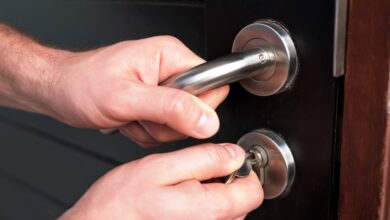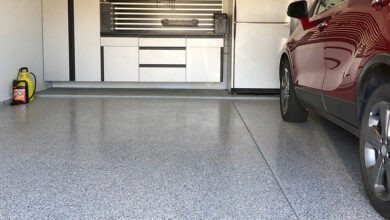12 Ways to Keep Your Home Safe and Secure

Ensuring the safety and security of your home is more important than ever in today’s world, where threats can appear in many forms. In Clearwater, Florida, homeowners need to be particularly careful because of environmental factors like hurricanes and flooding that can weaken both physical and digital defenses. The peaceful environment of Clearwater, with its beautiful beaches, requires specific strategies to protect homes effectively. In this blog, we will share proven tactics that guard against human threats and also prepare you for environmental challenges.
1. Install a Modern Alarm System
A sophisticated alarm system acts as the first line of defense against intruders. Opt for systems that offer real-time monitoring and include both fire and security alarms. Features like mobile alerts and automated system checks can help you stay informed about your home’s security status from anywhere. Many systems now integrate with smart home devices, allowing for greater control and automation. It’s wise to choose a system with backup power options to ensure functionality during power outages, which are a consideration in Clearwater.
2. Use High-Quality Locks
Strong, reliable locks are fundamental to securing your home. Invest in deadbolts for exterior doors, and consider adding smart locks that allow you to monitor door access remotely. Windows should have locks that are robust and tamper-resistant. For sliding doors, additional bars or locks can provide an extra layer of security. Remember, the quality of your locks greatly influences your home’s overall security.
3. Regular Maintenance Checks
Keeping your home maintenance up-to-date is essential for ensuring that all security measures function as intended. Regular inspections of locks, alarm systems, and structural elements like windows and doors can prevent unexpected failures. Here, the services of a reputable Clearwater water damage restoration company can be invaluable, particularly after severe weather, to restore and maintain security features. Proactive checks and timely repairs can avert many potential security breaches before they happen.
4. Secure Your Wi-Fi Network
An unsecured Wi-Fi network is a gateway for cyber threats. Ensure your network is protected with strong, unique passwords and consider using a VPN for additional security. Enable WPA3 encryption to make it harder for outsiders to access your network. Regularly update your router’s firmware to guard against exploits. It’s also a good idea to keep your home network and smart home devices on separate networks to contain any potential breaches.
5. Motion Detector Lighting
Motion detector lighting is an effective deterrent against unauthorized entry. Install lights around the perimeter of your home, focusing on entry points and shadowed areas where intruders might hide. These lights can be connected to your smart home system to alert you of movements at odd hours. Choose LED bulbs for longer life and better energy efficiency. Properly positioned, motion lights provide a simple yet effective security layer.
6. Install Surveillance Cameras
Surveillance cameras add a significant layer of security. Modern cameras not only record in high definition but also offer night vision and facial recognition technology. Strategically place cameras at all entry points and common areas, ensuring there are no blind spots. Wireless cameras that connect to the internet can send live feeds directly to your smartphone, allowing you to monitor your home remotely. Be sure to secure your cameras against hacking by using strong passwords and regular software updates.
7. Reinforce Entry Points
To strengthen the security of your home, reinforcing entry points like doors and windows is crucial. Adding security film to windows can make the glass harder to break, effectively deterring intruders who often rely on speed and stealth. Similarly, installing bars on windows can provide an additional layer of protection, especially for ground-floor or accessible windows.
For doors, consider upgrading to solid core or metal doors, which are significantly harder to breach than standard wooden doors. Adding deadbolt locks, strike plate locks, and even smart locks can further strengthen these entry points. For added security, ensure that the hinges are on the inside and that any glass panels are reinforced or positioned away from the lock mechanisms to prevent them from being a weak point. These practical measures can significantly increase your home’s resistance to forced entry, providing peace of mind in knowing your home is better protected.
8. Create a Safe Room
Every home should have a designated safe room for emergency situations. This room should be reinforced to withstand intrusions and extreme weather events. Equip it with necessary supplies such as water, non-perishable food, a first aid kit, and communication devices. Make sure it is easily accessible to all family members at all times. Tailoring this space to your specific needs can significantly increase your household’s safety during critical times.
9. Participate in a Neighborhood Watch
Being part of a neighborhood watch program can greatly improve the security of your community. Such programs foster collaboration among neighbors to monitor suspicious activities and report them to law enforcement. Regular meetings can keep everyone informed about local security issues. This collective vigilance helps deter crime as potential intruders know the neighborhood is actively monitored. Engage actively with your community to build a safer environment for everyone.
10. Keep Valuables Secure
To prevent theft, it’s vital to secure your valuables in a safe or a secured storage area. Consider using a safe that is bolted to the floor or hidden in a wall. Documenting and photographing valuables can aid in recovery in case of theft. Use technology like apps to keep a digital record of your possessions, which can be helpful for insurance claims. Teach family members about the importance of keeping valuable items out of plain view.
11. Educate Your Family on Security Protocols
Education is key to maintaining home security. Regularly discuss with your family the importance of security measures, such as locking doors and setting the alarm system. Conduct drills to practice what to do in case of an emergency, including how to exit the house safely and where to meet. Keep emergency contact numbers accessible to all family members. Such training ensures that everyone knows how to act swiftly and safely when necessary.
12. Review and Update Security Measures Regularly
Security technology and strategies evolve, so it’s important to stay updated. Review your security setup at least once a year to identify any areas that need improvement. Upgrade outdated systems and consider new security technologies that can offer better protection. Also, reassess your family’s changing needs, which may require adjustments to your security plans. Keeping your security measures current is essential for effective home protection.
Conclusion
Throughout this article, we’ve outlined several strategies to secure your home, emphasizing proactive measures and the use of modern technology. Implementing these tactics will not only safeguard your property but also provide peace of mind. Start by assessing your current security setup and identify any weaknesses that could be addressed. At the end of the day, the safety of your home depends on both the technology you install and the habits you practice daily. Make home security a priority today, and enjoy a safer tomorrow.



